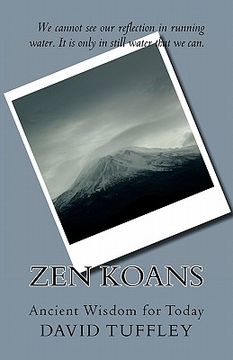Reseña del libro "zen koans (en Inglés)"
The kōan is an enigmatic or paradoxical question that defies logic, and forces you to break out of conventional modes of thinking, to use your imagination and intuition to arrive at a paradigm-shifting answer that moves you closer to enlightenment. A clichéd example that is commonly quoted is 'what is the sound of one hand clapping?' On the face of it, this seems like nonsense. Logic suggests that it takes two hands to make a sound. Many 'correct' answers have been suggested, but it is a mistake to think there is just one right answer; there are many. Some suggest that it is the same sound as two hands clapping, or that the answer lies in non-verbally outstretching one's hand to the questioner, inviting them to a reciprocal clap. With kōans you are simply going through a process of recognizing that logic, while useful, works by placing your thinking on a confining box with limited option. In Zen, you are invited to recognize that the only way out of this box is to shift the paradigm by thinking imaginatively with your right brain.There are many answers because everyone will come up with their own unique solution. It is the act of transcending the worldly mind that is the important part. This chapter presents some of the classic kōans from traditional Zen, originally written hundreds of years ago in Japanese, and re-interpreted from early English translations into early 21st Century English. The underlying meaning remains, so they will still work as a kōan should, but they are expressed in language more easily understood by people in the 21st Century. Each kōan encapsulates a profound truth worthy of deep reflection over a not-insignificant period of time. There are no quick answers, silver bullets here. There is great value buried deep in the kōan. Your job is to patiently dig for it. Zen is a practice dedicated to lessening the influence of your ego which is the prime impediment to your uncovering your own true nature. The ego is so strong that you could go your entire lifetime without even suspecting there is something deeper that is forever obscured by the ungoverned ego. Therefore we should listen to the voice of pines and cedars when no wind stirs. When you perceive that silent voice, you have entered the field of pure being that is behind the phenomenal world and which is your true nature. Example - the sound of one handWhat follows is an illustrative example of how a plain English version of the ancient kōan is expressed.A 12 year-old boy lived in a monastery. Every morning and evening, he saw the older monks go to the master's chamber, there to receive instruction in Zen. The boy asked to be included, but was told by the master that he was too young. He should wait awhile.But the boy was determined and somewhat impatient. He repeatedly asked the master if he might receive instruction too. Finally the master consented.In the evening, the boy went to the master's chamber. He struck the gong to announce his presence, and waited respectfully at the thresh-hold to be invited in. Upon receiving permission, he entered, bowed three times and sat before the master in silence, waiting for him to speak. The master said you can hear the sound of two hands clapping, now show me the sound of one hand. The boy thanked the master and went to his room to consider the meaning of this kōan. In the distance he could hear the music of the geishas. Ah, he thought, I have it!The following evening he went to the master to report his findings. When asked to illustrate the sound of one hand, he began to play the music of the geishas. No, no that is not it at all! Keep trying said the master.So the boy went to a quiet place to consider, away from the sound of music. The only sound audible in this place was the sound of dripping water. Ah, that must be it he thought. (word limit reached)

